| | | OFFLINE | | Post: 19.700
Post: 2.342 | Registrato il: 28/08/2005
Registrato il: 20/01/2009 | Administratore | Utente Veteran | |
|
 GENERAL AUDIENCE TODAY:
GENERAL AUDIENCE TODAY:
Catechesis on St. Bonaventure (3)
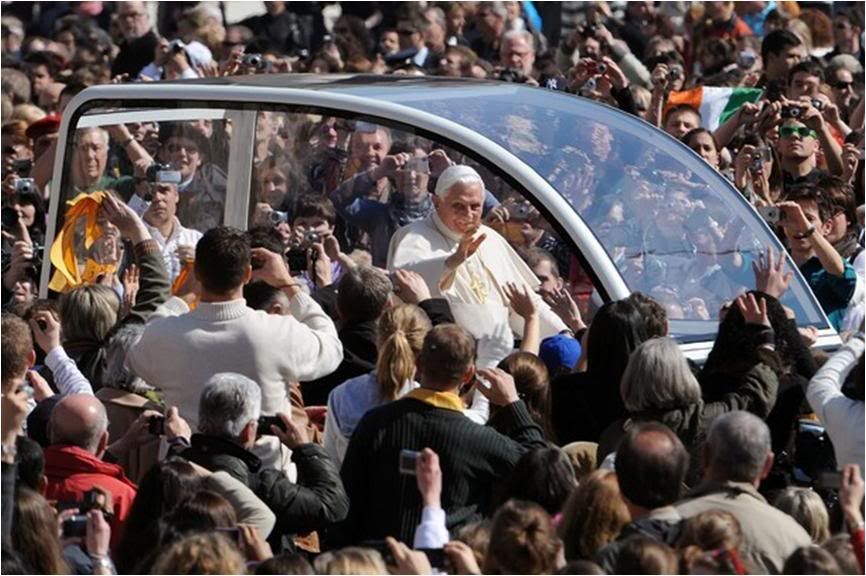
With warmer weather, the General Audience was held in St. Peter's Square today. During his English synthesis of today's catechesis on St. Bonaventure - the third in a row - the Holy Father announced he will be signing his pastoral letter to Irish Catholics on Friday, March 19.
In our catechesis on the Christian culture of the Middle Ages, we turn once more to Saint Bonaventure. Bonaventure was a contemporary of Saint Thomas Aquinas, and the two great theologians reveal the rich diversity of the theology of the thirteenth century.
Whereas Thomas saw theology as primarily a theoretical science, concerned with knowing God, Bonaventure saw it as practical, concerned with that "wisdom" which enables us to love God and conform our wills to his. Thomas’s emphasis on truth complements Bonaventure’s emphasis on love within the unity of a great common vision.
As a Franciscan, Bonaventure reflects the primacy of love embodied in the life of Saint Francis. He was also deeply influenced by the theology of Pseudo-Dionysius, with its emphasis on the heavenly hierarchies which serve as steps leading the creature to communion with the Triune God.
Pseudo-Dionysius also inspired his reflections on the darkness of the Cross, where, in the ascent of the mind to God, reason can go no further and love enters the divine mystery. As a great master of prayer, Bonaventure invites us to let our minds and hearts rise from the contemplation of creation to rest in God’s eternal love.
Today is the feast of Saint Patrick, and in a special way I greet all the Irish faithful and pilgrims here present.
As you know, in recent months the Church in Ireland has been severely shaken as a result of the child abuse crisis. As a sign of my deep concern I have written a Pastoral Letter dealing with this painful situation.
I will sign it on the Solemnity of Saint Joseph, the Guardian of the Holy Family and Patron of the Universal Church, and send it soon after.
I ask all of you to read it for yourselves, with an open heart and in a spirit of faith. My hope is that it will help in the process of repentance, healing and renewal.
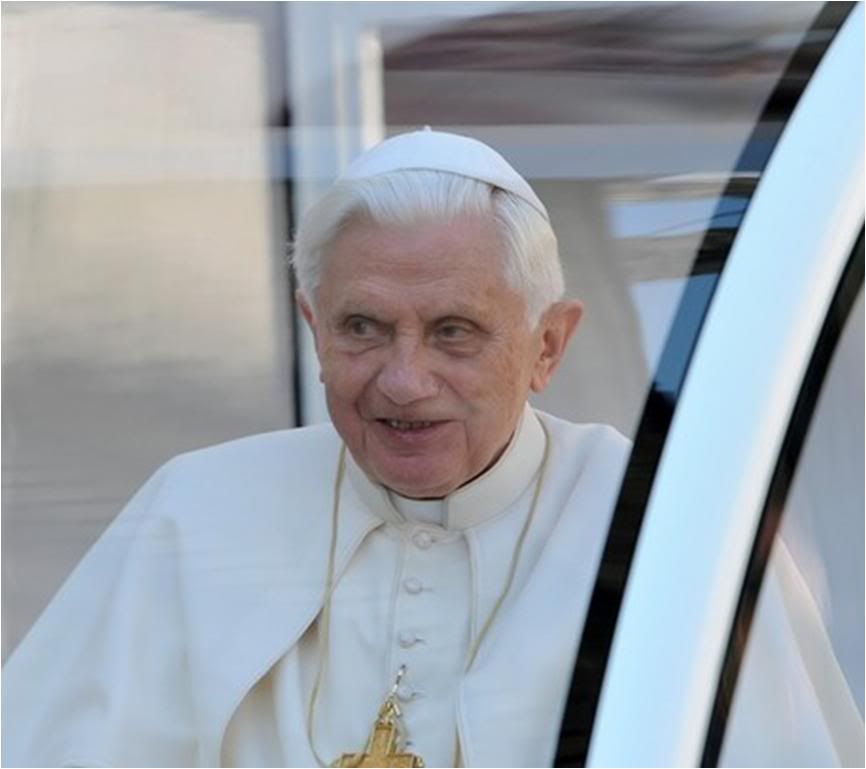
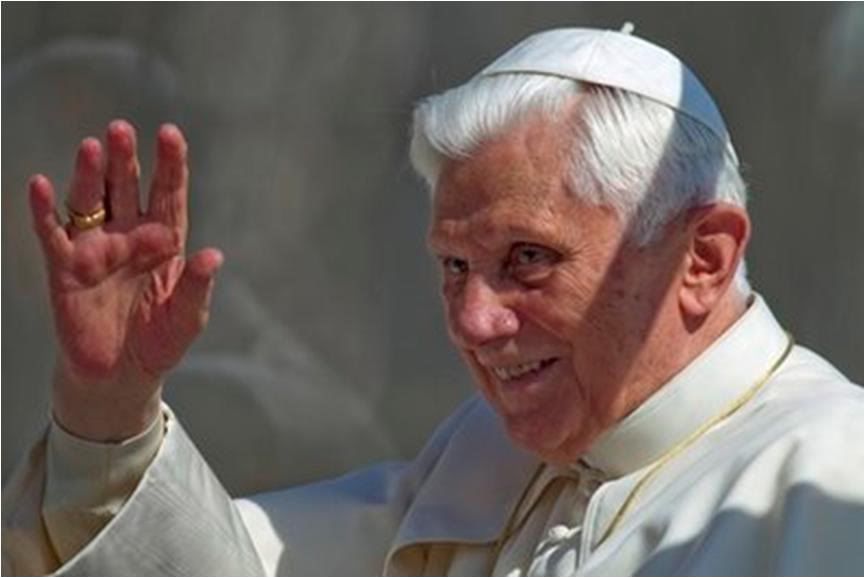
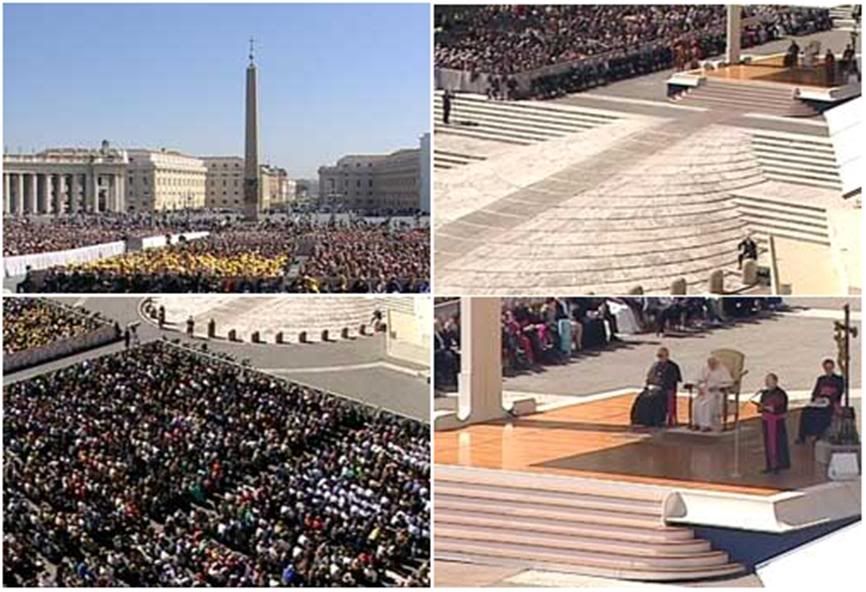
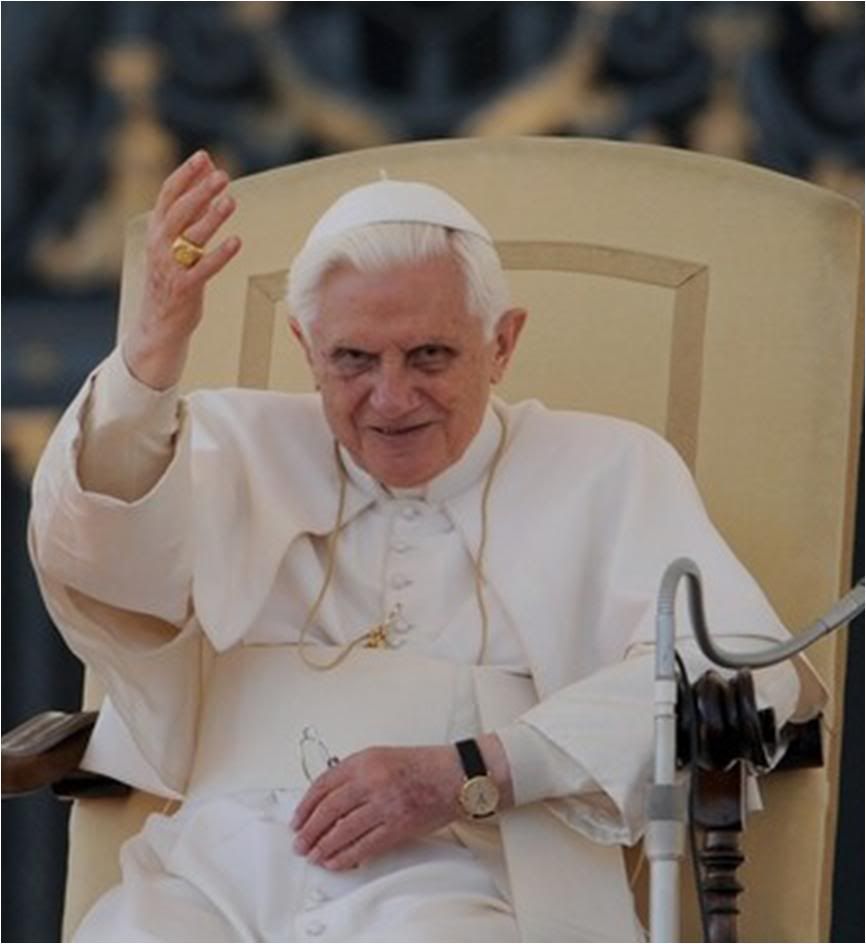
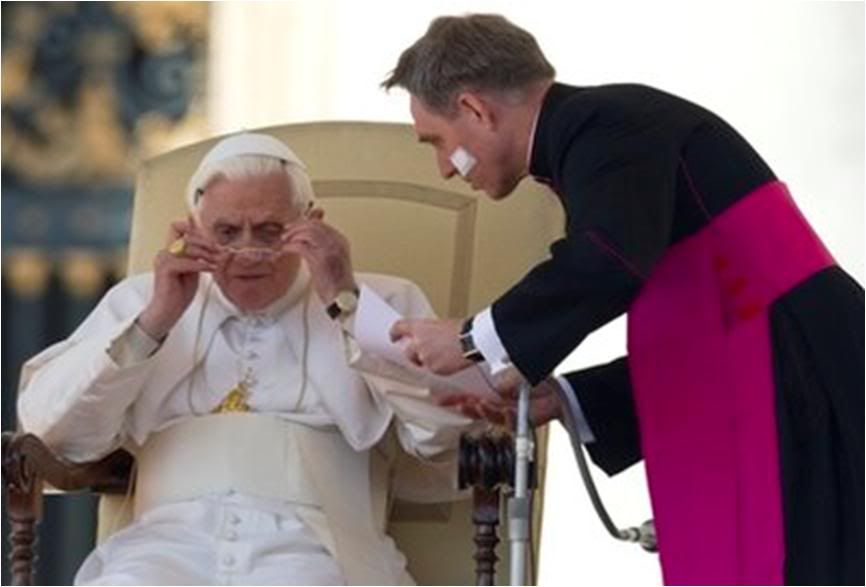
Here is a translation of the Holy Father's catechesis:
Dear brothers and sisters,
This morning, continuing the reflection from last Wednesday, I wish to examine in depth with you other aspects of the doctrine of St. Bonaventure of Begnoregio.
He is an eminent theologian, who deserves a place place alongside another very great thinker, his contermpoarary, St. Thomas of Aquinas. Both had scrutinized the mysteries of Revelation, using the resources of the human reason, in that fruitful dialog between faith and reason that characterized the Christian Middle Ages and made it an era of great intellectual liveliness, as well as faith and ecclesial renewal, that is often not adequately appreciated.
There are other analogies between them: Both Bonaventure, a Franciscan, and Thomas, a Dominican, belonged to the Mendicant Orders which, with their spiritual freshness, as I pointed out in previous catecheses, renewed the entire Church in the 13th century and attracted great following.
Both served the Church with diligence, passion and love, and were both invited to the Ecumenical Council of Lyons in 1274, the same year in which both died - Thomas while he was en route to Lyons, Bonaventure during the Council itself.
Even in St. Peter's Square, their statues are placed in parallel, right where the Colonnade opens up from the facade of St. Peter's Basilica - one on the left arm of the Colonnade, the other on the right.
But despite the analogies, we can also appreciate in these two great saints two different approaches to philosophical and theological study, which demonstrate their individual originality and profundity of thought. I would like to point to some of these differences.
A first difference was in their concept of theology. Both future Doctors of the Church asked whether theology was a practical science or theoretical and speculative. St. Thomas reflected on two possible but opposite responses.
The first was: Theology is a reflection on faith, and the purpose of faith is that man may be good, and live according to God's will. Therefore, the purpose of theology should be to guide man on the right and correct path. Consequently, it is basically, a practical science.
The other position says: Theology seeks to know God. We are creatures of God; God oversees everything we do. God works on us to act right. Therefore, theology is substantially not about what we do, but about knowing God.
St. Thomas concluded that theology implies both aspects: it is theoretical - it seeks to know God ever better; and it is practical - it seeks to orient our life towards the good. But knowledge has primacy: we must first of all know God, then it follows that we act according to God's will (Summa Theologiae Ia, q. 1, art. 4).
This primacy of knowledge over practice is significant in St. Thomas's basic orientation.
St. Bonaventure's answer was very similar, but with different emphases. He knew the arguments for both sides as St. Thomsa did, but to answer the question of whether theology is a practical or a theoretical science, he made a triple distinction.
Thus, he widened the alternatives between theoretical (primacy of knowledge) and practical( primacy of practice) by adding a third attitude that he called 'sapiential', in which wisdom embraces the two other aspects.
He continues: Wisdom seeks contemplation (as the highest form of knowledge) and its purpose is "ut boni fiamus" - that we may become good. This above all: to become good (cfr Breviloquium, Prologus, 5).
He adds: "Faith is in the intellect in such a way that it provokes affection. For example: to know that Christ died 'for us' does not simply remain as knowledge, but it necessarily becomes affection, love (Proemium in I Sent., q. 3). He pursues his defense of theology along the same line, namely, as the rational and methodical reflection on faith.
St. Bonvaneture also lists some arguments against 'doing theology', perhaps widespread among some Franciscan friars then, and present even in our time: when reason would 'empty out' faith and would become a violent with respect to the Word of God, then we must listen to the Word and not analyze it (cfr Letter of Francis of Assisi to Anthony of Padua).
To these arguments against theology that demonstrate the perils existing in theology itself, Bonaventure replies: It is true that there is an arrogant manner of doing theology, an arrogance of reason which places itself above the Word of God. But true theology, the rational work of true and good theology, has an origin other than the arrogance of reason.
He who loves always wants to know the loved one more and better. True theology does not engage reason and the search for it, motivated by arrogance, "sed propter amorem eius cui assentit" – it is motivated by love for him to whom he has given his assent (Proemium in I Sent., q. 2), the beloved whom he wants to know better. This, he said, is the fundamental intention of theology. For St. Bonaventure, then, ultimately it is the primacy of love which is decisive.
As a consequence, St. Thomas and St. Bonaventure defined the ultimate destiny of man differently, {what constituted) his full happiness. For St. Thomas the supreme goal towards which our desire is oriented is to see God. And in the simple act of seeing God, all problems will find a solution. We are happy, and nothing else is needed.
For St. Bonaventure, the ultimate destiny of man was to love God - to meet him and unite oneself to him and to his love. This, for him, was the most adequate definition of human happiness.
Along this line, we can also say that for St. Themas, the highest category was the true, and for St. Bonaventure, the good.
But it would be wrong to see in these two answers a contradiction. In both cases, the true is also the good, and the good is also the true. To see God is to love him, and to love him is to see him.
Thus, it is a question of different emphases in a fundamentally common vision. Both emphases have formed different traditions and spiritualities, thus demonstratibg the fecundity of the faith, which is one in the diversity of its expressions.
Let us return to St. Bonaventure. It is evident that the specific emphassis of this theology, of which I have given only one example, can be explained by the Franciscan charism. The Poverello of Assisi, who was above the intellectual debates of his time, demonstrated with his entire life the primacy of love.
He was a living icon enamored with Christ, and thus in his time, he rendered present the figure of the Lord. He convinced his contemporaries not by words but by his life.
In all the works of St. Bonaventure, even his scientific works, those meant for teaching, one sees and one finds this Franciscan inspiration. It is evident that his thinking took off from his encounter with the Poverello of Assisi.
But in order to understand the concrete elaboration of the theme 'primacy of love', we must keep in mind yet another source: the writings of the so-called Pseudo-Dionigi, A Syrian theologian of the sixth century who hid under the pseudonym of Dionysius the Areopagite, referring with this name to a figure in the Acts of the Apostles (cfr 17,34).
This theologian had created a liturgical theology as well as a mystical theology, and he had written amply on the various angelic orders. His writings were translated to Latin in the ninth century. In the time of St. Bonaventure - that is, the 13th century - a new translation appeared which aroused the interest of the saint and other theologians in his century.
Two things in particular drew the attention of St. Bonaventure:
1. The Pseudo-Dionysius wrote of the nine angelic orders, whose names he found in Scripture and which he then arranged in his way, from the simple angels up to seraphim. St. Bonaventure interpreted these angelic orders as steps in man's approach toward God. Thus, they can represent the human journey, man's ascent towards communion with God.
St. Bonaventure had no doubt that St. Francis belonged to the seraphic order, the supreme order, the choir of seraphim, and therefore, pure flame of love. And that was how Franciscans ought to be.
But St. Bonaventure knew well that this last step in the approach to God cannot be legislated into a juridical order, that it would always be a special gift from God. And that is why the structure of the Franciscan Order is more modest, more realistic, but it must, noetheless, help its members to get ever closer to a seraphic existence of pure love.
Last Wednesday, I spoke about this synthesis of sober realism and evangelical radicalness in the thoughts and actions of St. Bonaventure.
2. However, the saint also found in the writings of the Pseudo-Dionysius another element that, for him, was even more important. Whereas for St. Augustine, intellectus - seeing with reason and the heart - was the last category of knowledge, the Pseudo-Dionysius took it one step further: In the ascent toward God, one can reach a point where reason can no longer see. But in the night of the intellect, love still sees - and it sees how much tehre is that remains inaccessible to reason.
Love goes beyond reason - it sees more, it enters more profoundly into the mystery of God. St. Bonaventure was fascinated by this vision, which corresponded to his Franciscan spirituality. Precisely in the dark night of the Cross, all the grandeur of divine love appears. Where reason no longer sees, love does.
The concluding words of his Journey of the Mind towards God may seem, on superficial reading, to be an exaggerated expression of devotion that is devoid of content. But if it is read in the light of St. Bonaventure's theology of the Cross, it is a limpid and realistic expression of Franciscan spirituality:
"If now you yearn to know how this can happen [the ascent towards God], ask grace, not doctrine; desire, not the intellect; the pleading of prayer and not the study of words: not light, but the fire that inflames everything and transports it to God" (VIII,6).
All this is not anti-intellectual nor anti-rational: It presupposes the way of reason but transcends it in the love of the Crucified Christ. With this transformation of the Pseudo-Dionigi's mysticism, Bonaventure began a great mystical current that has greatly elevated and purified the human mind - it is a peak in the history of the human spirit.
This theology of the Cross, born from the encounter between the theology of the Pseudo-Dionyisus and Franciscan spirituality, should not make us forget that St. Bonaventure also shared with St. Francis of Assisi the love of Creation, joy in the beauty of God's Creation.
I cite in this regard a sentence from the first chapter of the 'Journey..': "He.. who does not see the numberless splendors of creation is blind. He who does not awake from its many voices is deaf. He who does not praise God for all these wonders is mute. And he who, from so many signs, does not exalt the first principle, is foolish" (I,15). All of creation speaks out loud of God, of God the good and the beautiful, of his love.
Thus, for St. Bonaventure, all our life is a 'journey', a pilgrimage - an ascent towards God. But with our own powers alone, we cannot ascend to the level of God. That is why prayer is necessary.
Prayer, said the saint, is the mother and origin of elevation -
sursum actio, an act that raises us.
So I conclude with the prayer with which he started the 'Journey': "Then let us pray and say to the Lord our God: Lead me, Lord, along your way, and I will walk in your truth. My heart rejoices in awe of your name" (I.1).
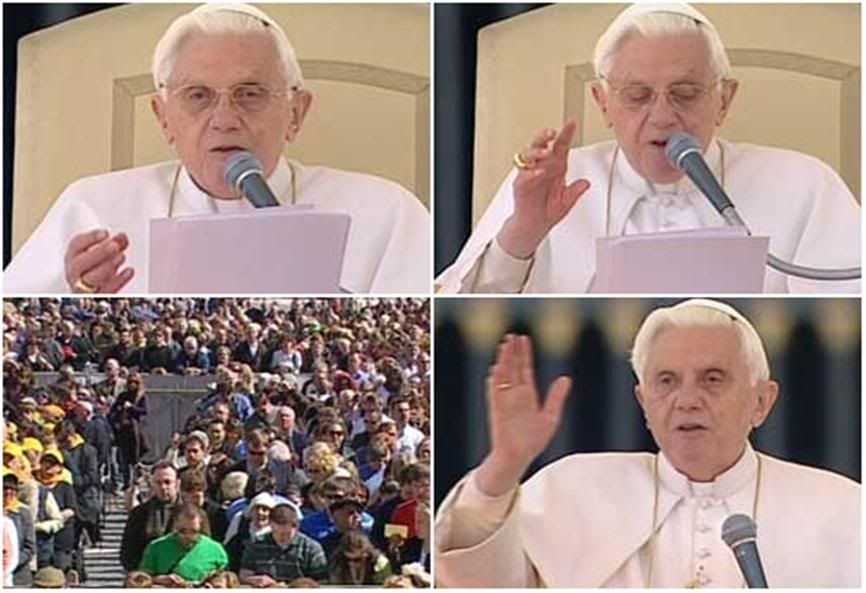 WOW again! These catecheses by the Holy Father are a continuing marvel of exposition, an adventure in discovery, in which he presents men and ideas so integrally, at the same time enabling us simple listeners to sample his connoisseur's easy grasp of biography and history, philosophy and theology, literature and art, faith and reason, man and God.
WOW again! These catecheses by the Holy Father are a continuing marvel of exposition, an adventure in discovery, in which he presents men and ideas so integrally, at the same time enabling us simple listeners to sample his connoisseur's easy grasp of biography and history, philosophy and theology, literature and art, faith and reason, man and God.
How far removed it all is from the everyday world, a refuge from the big bad world of media and pedophile priests!
BENEDICTUS QUI VENIT IN NOMINE DOMINI!
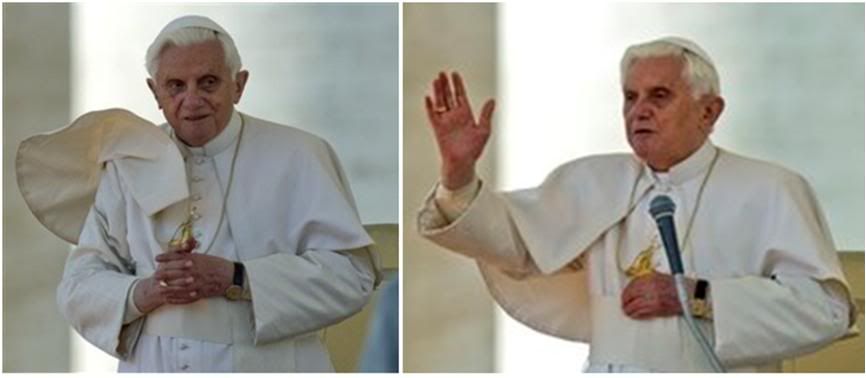 I think this little 'sidelight' needs to be addressed better:
THE SHOUTING MAN
I think this little 'sidelight' needs to be addressed better:
THE SHOUTING MAN
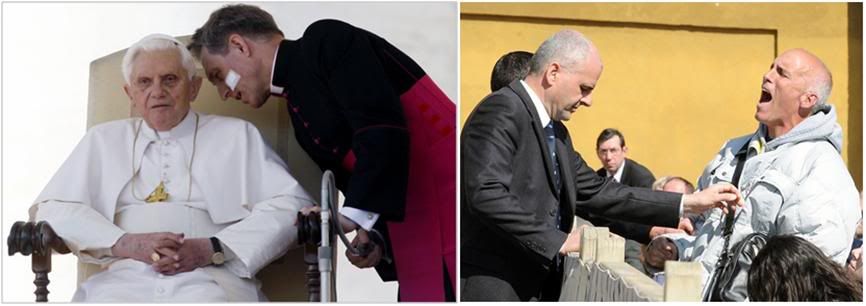 Above, Mons. Gaenswein appears to be informing the Pope about a man who began shouting shortly after the Pope had given his greeting in German and before he started his English greeting.
Above, Mons. Gaenswein appears to be informing the Pope about a man who began shouting shortly after the Pope had given his greeting in German and before he started his English greeting.
Initial reports claimed the man was shouting abuses at the Pope, Indeed, the first photo-captions by the Anglophone newsphoto agencies alleged that he was shouting, 'BULLS***, BULLS***' at the Pope! [See how they automatically assumed that if someone was screaming in St. Peter's Square, it must have been against the Pope! Fortunately, the pictures of the Pope withthe crowd are always thee for all to see.]
Subsequently, it was clarified he was part of an anti-abortion delegation from the US and he was railing against pro-abortion politicians. He was taken away by Vatican police for questioning but later released.
Here is what Cindy Wooden of CNS wrote about the incident at the end of her story today about the GA:
... Just before the Pope began speaking, a man in the audience began shouting "abortion" and yelled for the Pope to "excommunicate Nancy Pelosi and Joe Biden," respectively, the Speaker of the U.S. House of Representatives and the Vice President of the United States.
The man was escorted out of St. Peter's Square by Vatican security. Because he was not arrested, the Vatican refused to release his name.
[Modificato da TERESA BENEDETTA 19/03/2010 03:09] |